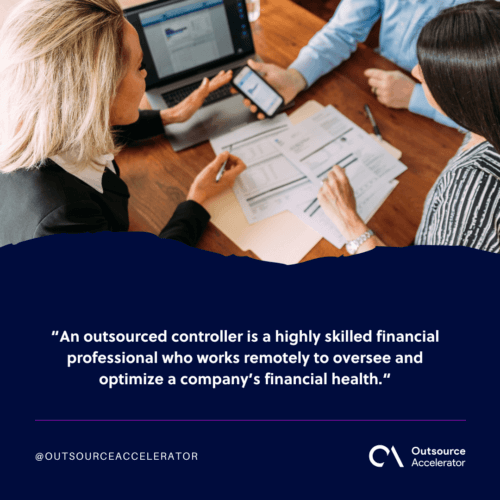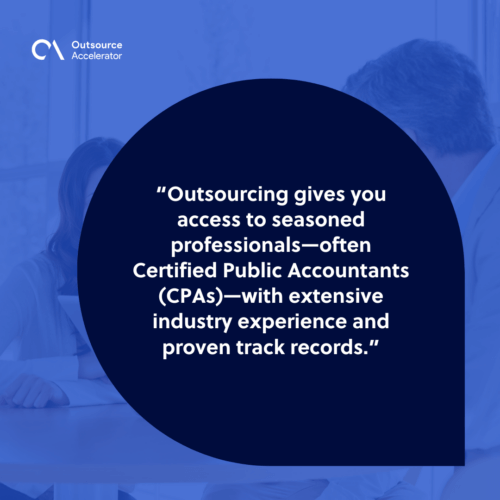Outsourced controller: A driver of smarter financial management

For many companies, especially small to medium-sized businesses (SMBs), balancing day-to-day operations with effective financial management can be a real challenge.
Managing transactions, tracking expenses, and maintaining accurate financial records can quickly become overwhelming. Without the right systems and expertise, it’s easy to miss opportunities, make inefficient decisions, and lose sight of the bigger financial picture.
That’s where an outsourced controller comes in.
Far from being just another cost-saving measure, an outsourced controller acts as a strategic partner. They bring in managerial-level expertise, advanced financial tools, and fresh insights to help guide smarter decision-making.
In this article, we’ll explore how outsourcing your controller role can take your financial operations well beyond basic bookkeeping, giving your business a stronger strategic edge in a competitive market.
What is an outsourced controller?
An outsourced controller is a highly skilled financial professional who works remotely to oversee and optimize a company’s financial health.
Their role typically covers:
- Financial analysis and reporting
- Forecasting and budgeting
- Compliance management
- Cash flow management and audit preparation
- Internal control and supervision
Outsourced controllers and their services are more accessible than ever, thanks to trusted service providers in rising outsourcing destinations like the Philippines and India.

Key qualities of an effective outsourced controller
A strong outsourced controller should possess comprehensive technical and financial management skills, backed by interpersonal skills, strategic vision, and system applications.
Here are the key qualities to look for when choosing the right outsourced one for your business:
1. Comprehensive industry knowledge
While outsourced controllers are well-versed in core accounting standards, their expertise should go far beyond the basics. They should bring a broad skill set that supports accurate financial analysis, reliable forecasting, and strong internal controls.
Your outsourced controller should be able to take the lead in tax planning and compliance if needed. In some cases, they will serve as tax experts—helping businesses avoid the additional cost of hiring a separate tax specialist.
2. Strategic planning and business forecasting
An effective outsourced controller doesn’t just report numbers; they evaluate, interpret, and analyze as the basis for strategic guidance.
They take the time to understand their respective clients’ industries to develop more relevant solutions and valuable insights into their current market challenges and trends.
Outsourced controllers also support the organization using their ability to analyze complex financial problems, identify root causes, and propose practical solutions.
3. Attention to detail and high-level organizational skills
The best outsourced controllers pair precision with efficiency. Their keen attention to detail ensures accuracy in every report, while their organizational skills keep financial operations running smoothly, no matter how complex the structure.
By maintaining order and precision, they help prevent costly errors, streamline workflows, and ensure that critical financial information is always accessible when needed.
Advantages of hiring an outsourced controller in business
Adapting the services of an outsourced controller to your business’s daily operation offers several advantages, particularly for SMBs.
Here’s a quick peek at these benefits:
1. Access to high-level expertise and strategic insights
Outsourcing gives you access to seasoned professionals—often Certified Public Accountants (CPAs)—with extensive industry experience and proven track records.
These experts stay current with the latest innovations in accounting principles, evolving tax regulations, and emerging trends in financial management.
Their strategic insights help you make informed decisions, stay compliant, and maintain a competitive edge in your market.

2. Increased scalability and flexibility
As a business grows, so does the complexity of its financial operations. Transactions multiply, compliance requirements become more demanding, and the need for accurate, timely reporting intensifies.
By outsourcing top-tier controllers, companies can easily scale their financial systems and processes without the delays and costs of hiring and training additional in-house staff.
These professionals can adapt quickly to changing market conditions, regulatory updates, and shifting business priorities. They ensure your financial management keeps pace with your growth.
3. Improved financial reporting and compliance
If you need help in streamlining your processes, outsourced controllers can help.
Outsourced controllers bring efficiency and accuracy to financial reporting, ensuring that statements are prepared on time and in full compliance with regulatory standards.
They stay updated with the latest updates on financial technologies and tax regulations, which helps businesses stay compliant and avoid costly penalties or other legal issues.
Beyond compliance, outsourced controllers provide real-time insights into your company’s financial health. With clear, accurate data at hand, leaders can make proactive, well-informed decisions that drive growth and stability.
Gain smarter financial decisions through outsourced controller services
Hiring an outsourced controller is more than just a business trend; it’s a strategic advantage in today’s complex financial environment.
Through their expertise, your organization can achieve scalability, adaptability, and precision in managing everything from reporting and compliance to strategic planning.
The value goes beyond cost savings; it’s about transforming your financial operations into a data-driven, insight-rich function that empowers smarter decision-making.
Now is the time to strengthen your operations and unlock your company’s full financial potential by partnering with a skilled outsourced controller.







 Independent
Independent




